- Home
- Sebastian Faulks
Jeeves and the Wedding Bells
Jeeves and the Wedding Bells Read online
Contents
About the Book
About the Authors
Also by Sebastian Faulks
Title Page
Dedication
Author’s Note
Chapter One
Chapter Two
Chapter Three
Chapter Four
Chapter Five
Chapter Six
Chapter Seven
Chapter Eight
Chapter Nine
Chapter Ten
Chapter Eleven
Copyright
About the Book
Bertie Wooster, recently returned from a very pleasurable sojourn in Cannes, finds himself at the stately home of Sir Henry Hackwood in Dorset. Bertie is more than familiar with the country house set-up: he is a veteran of the cocktail hour and, thanks to Jeeves, his gentleman’s personal gentleman, is never less than immaculately dressed.
On this occasion, however, it is Jeeves who is to be seen in the drawing room while Bertie finds himself below stairs – and he doesn’t care for it at all.
Love, as so often, is at the root of the confusion. Bertie, you see, has met Georgiana on the Côte d’Azur. And though she is clever and he has a reputation for foolish engagements, it looks as though this could be the real thing. However, Georgiana is the ward of Sir Henry Hackwood and, in order to maintain his beloved Melbury Hall, the impoverished Sir Henry has struck a deal that would see Georgiana becoming Mrs Rupert Venables.
Meanwhile, Peregrine ‘Woody’ Beeching, one of Bertie’s oldest chums, is desperate to regain the trust of his fiancée Amelia, Sir Henry’s tennis-mad daughter.
But why would this necessitate Bertie having to pass himself off as a servant when he has never so much as made a cup of tea? Could it be that the ever-loyal, Spinoza-loving Jeeves has an ulterior motive?
Evoking the sunlit days of a time gone by, Jeeves and the Wedding Bells is a delightfully witty story of mistaken identity, a village midsummer festival, a cricket match and love triumphant.
About the Authors
Sebastain Faulks’s books include the bestsellers A Possible Life, A Week in December, Human Traces, On Green Dolphin Street, Charlotte Gray and Birdsong.
In his acclaimed 2011 book Faulks on Fiction, which accompanied his series for BBC Two, Sebastian Faulks wrote, ‘If I were to be quite honest, I suppose I would have to admit that a scene in The Mating Season is probably my favourite in the whole canon of English literature.’ As a lifelong fan of P.G. Wodehouse, he was delighted to be asked by the Wodehouse Estate to write a new novel using the immortal characters of Jeeves and Wooster.
P.G. Wodehouse wrote more than ninety novels and some three hundred short stories over seventy-three years. Perhaps best known for the escapades of Bertie Wooster and Jeeves, Wodehouse also created the world of Blandings Castle, home to Lord Emsworth and his cherished pig, the Empress of Blandings. His stories include gems concerning the irrepressible and disreputable Ukridge; Psmith, the elegant socialist; the ever-so-slightly unscrupulous Fifth Earl of Ickenham, better known as Uncle Fred; and those related by Mr Mulliner, the charming raconteur of The Angler’s Rest, and the Oldest Member at the Golf Club.
In 1936 he was awarded the Mark Twain Medal for ‘having made an outstanding and lasting contribution to the happiness of the world’. He was made a Doctor of Letters by Oxford University in 1939, and in 1975, aged ninety-three, he was knighted by Queen Elizabeth II. He died shortly afterwards, on St Valentine’s Day.
Also by Sebastian Faulks
FICTION
A Trick of the Light
The Girl at the Lion d’Or
A Fool’s Alphabet
Birdsong
Charlotte Gray
On Green Dolphin Street
Human Traces
Engleby
Devil May Care
A Week in December
A Possible Life
NON-FICTION
The Fatal Englishman: Three Short Lives
Pistache
Faulks on Fiction
To the memory of P.G. Wodehouse – and for all those who have laughed at and treasured his books.
THIS BOOK IS intended as a tribute – from me, and on behalf of any others who don’t think it falls too lamentably short of the mark – to P.G.Wodehouse: a thank you for all the pleasure his work has given. I have been reading him with joy and admiration for almost half a century. I am no expert or mastermind on things Wodehousean; I am just a fan.
The great man’s descendants hope, I know, that a new novel may help to bring the characters of Jeeves and Bertie to a younger readership – that lucky group of people who have yet to open The Mating Season or Right Ho, Jeeves. I hope so too, and I envy them the joys that lie in store.
To the old hands, meanwhile, I would say only this: that yes, I did understand the size of what I had taken on; and yes it was as hard as I expected. Wodehouse’s prose is a glorious thing; and there’s the rub. I didn’t want to write too close an imitation of that distinctive music for fear of sounding flat or sharp. Nor did I want to drift into parody. What I therefore tried to do was give people who haven’t read the Jeeves books a sense of what they sound like; while for those who know them well I tried to provide a nostalgic variation – in which a memory of the real thing provides the tune and these pages perhaps a line of harmony.
I would like to thank Gillon Aitken, Peter Straus, Jocasta Hamilton, Keith Kahla, and Gail Rebuck for easing it all into print, and Edward Cazalet, P. G. Wodehouse’s step-grandson for his encouragement.
I hope that readers of this story will be encouraged to go back to the peerless originals, and thence to a brighter world.
Sebastian Faulks
November 2013
I WAS WOKEN in the middle of the night by what sounded like a dozen metal dustbins being chucked down a flight of steps. After a moment of floundering in the darkness I put my hand on the source of the infernal noise: the twin copper bells on top of a large alarm clock. There followed a brief no-holds-barred wrestling bout before I was able to shove the wretched thing beneath the mattress.
It was a panting and lightly perspiring B. Wooster who then consulted his wristwatch to find that it was in fact six o’clock – the appointed hour at which I was to throw off the bonds of slumber and rise to tackle my new duties.
This was a dashed sight harder than it sounds. Easing the person to an even semi-recumbent position caused pains to shoot across the small of the back. Whoever had designed the palliasse on which I had lain these seven hours had clearly been of the opinion that nature’s sweet restorer, as I have heard Jeeves call it, can get the job done in five-minute bursts. It required a steadying grip on the bedstead before I could cross the bare boards and don the dressing gown. It’s possible that a sharp-eared observer might have heard a few groans as, sponge bag in hand, I headed down the passageway towards the servants’ bathroom.
Mercifully, I seemed to be the first to the ablutions. Hot water came from a geyser in a boiling trickle over the bath, but in the basin the H and C taps might more accurately have been labelled ‘Cold’ and ‘Frozen’. It was a haggard Bertram who stared back from the glass as he plied the morning steel and sponged the outlying portions. I dried off with a strip of material less like a towel than a yard of well-used sandpaper.
It’s funny how quickly one gets used to certain things in life. At school we had been compelled, on pain of six of the juiciest, to keep a keen eye on our kit and know at all times where the socks (grey, six pairs) and footer bags (navy blue, two pairs) were to be found. The services of Tucker, my accommodating scout at Oxford, however, and several years of Jeeves’s care had left me rather vague in such matters. To say it was so
mething of a trial to dress myself in the uniform of a gentleman’s personal gentleman would be an understatement. Eventually, after several attempts and some pretty fruity language, the shirt, collar stud and tie achieved some sort of coming-together, after which the outer garments were a breeze. Pausing only to rub the shoe on the back of the trouser, I went gingerly out on to the landing and down the back staircase, which gave off a powerful whiff of lime wood.
There was a lengthy passageway that led to the kitchens. I pushed at the double doors and entered the cook’s domain with as near as I could manage to a spring in the step. To fill the kettle and bung it on the range was the work of an instant; the problems began with an attempt to locate pot, tea leaves, milk and so forth. I had never previously paused to think just how many items go into the making of the morning cupful. I opened a hopeful-looking cupboard to be confronted by a variety of what may have been fish kettles.
I pushed off into the scullery, where I spied a bottle of milk with a paper twist. A quick sniff established that it was not of recent origin and I was beginning to feel that I was not cut out for this sort of thing when I heard footsteps outside.
Fearing the cook, Mrs Padgett, would not take kindly to an intruder, I made as if to exit towards the dining room, but to my surprise it was the housekeeper, Mrs Tilman.
‘Mr Wilberforce! Goodness, you are the early bird!’
‘Yes, what ho! A lot of worms to catch, don’t you know. I was just looking for the tea leaves.’
‘Are you taking up tea for Lord Etringham? Isn’t it a bit early?’
‘Seven o’clock was what he told me.’
‘I think seven-thirty’s quite soon enough. Why don’t you get on with some shoe-cleaning and let me make the tea in a moment. Goodness me, you’ve put enough water in the kettle for a regiment of soldiers. Off you go down to the butler’s pantry. You’ll find polish in the cupboard. And you brought down Lord Etringham’s shoes last night, didn’t you?’
‘I did indeed. Two pairs of them.’
I left the tea-making in the hands of this excellent woman and got down to some spit and polish work on the black Oxfords and the brown brogues, size eight, that I had scooped up the night before. In my experience, the butler’s pantry, in addition to corkscrews, candles and other odd bits of chandlery often holds a bottle or two of the right stuff, but it was too early in the morning even for a constitution as strong as mine. The thought, however, bucked me up a little. I wouldn’t say that a song rose to the Wooster lips as I worked, but I went about the buffing and shining with a certain gusto.
When I returned to the kitchen, I found that Mrs Tilman had laid a tray with all the fixings.
‘Oh dear, look at you, Mr Wilberforce. You didn’t put on your apron, did you? You’ve got polish on your shirt. Here. Let me.’
With a cloth, she removed most of a black smear from the affected area; and, with the coat re-buttoned, she seemed to think I was ready for action.
I turned to the waiting tray and attempted to raise it to a carrying position.
‘You’re all fingers and thumbs, aren’t you, dear? Nothing to be nervous of. Come on now, this way.’
So saying, the housekeeper waved me down the corridor towards the green baize door, which I was obliged to open with an undignified nudge from the rear end.
Things stayed on a fairly even keel as I crossed the main hall to the oak staircase and began my ascent. There was a square half-landing before a shorter flight to the first floor. My destination was a corner room of dual aspect that overlooked the rose garden and the deer park. Most of the tea was still in the pot when I lowered the tray to the floor and knocked.
‘Come in,’ said a familiar voice.
I’ve seen the insides of a few country house bedrooms in my time, but I must say Lord Etringham had really landed seat-first in the butter. I found him sitting up in bed in a burgundy dressing gown with a light paisley pattern that I recognised as one of my own and reading a book whose title, if I remember right, was The Critique of Pure Reason by one Immanuel Kant.
‘Your tea, Lord Etringham,’ I said. ‘Thank you. Please be so good as to leave it by the bed,’ replied Jeeves – for it was he and no bona fide member of the aristocracy who reclined among the crisp linens of the four-poster.
‘I trust you slept well,’ I said, with a fair bit of topspin.
‘Exceedingly well, thank you, sir.’
But hold on a minute. I see I’ve done it again: set off like the electric hare at the local dog track while the paying customers have only the foggiest idea of what’s going on. Steady on, Wooster, they’re saying: no prize for finishing first. What’s this buttling business, and why the assumed names? Are we at some fancy-dress ball? Put us in the picture, pray, murky though it be …
Very well. Let me marshal my facts.
In the month of May, about four weeks before this hard kitchen labour, I had taken a spring break in the south of France. You know how it is. It seemed an age since the ten days in January I had spent at the Grand Hotel des Bains up in the Alps and the pace of life in the old metrop had become a trifle wearing. So I instructed Jeeves to book two rooms in a modest hotel or pension on the Promenade des Anglais and off we went one Friday night from Paris on the Train Bleu.
I envisaged a spartan regime of walking in the hills, a dip in the sea if warm enough, some good books and early nights with plenty of Vichy water for good measure. And so it was for a couple of days, until a misunderstanding of swing-door etiquette as I re-entered my hotel early one evening caused a fellow guest to go sprawling across the marble floor of the lobby. When I had helped her to reassemble her belongings, I found myself staring into the eyes of perhaps the most beautiful girl I had ever seen. It seemed only gallant to invite her into the Bar Croisette for something to restore the bruised tissues while I continued my apologising.
Georgiana Meadowes was the poor girl’s name. She worked for a publisher in London and had come south for a few days to labour away on the latest typescript from their best-selling performer. I had only the faintest idea of what this entailed, but held my end up with a few ‘indeed’s and ‘well I never’s.
‘Do you do a lot of this editing stuff on the Côte d’Azur?’ I asked.
She laughed – and it made the sound of a frisky brook going over the strings of a particularly well-tuned harp. ‘No, no, not at all. I usually sit in the corner of a small office in Bedford Square working by electric light. But my boss is very understanding and he thought it would do me good – help clear my mind or something.’
We Woosters are pretty quick on the uptake, and from this short speech I deduced two things, viz.: one, that this G. Meadowes had a dilemma of a personal nature and, two, that her employer prized her services pretty highly. But one doesn’t pry – at least not on first acquaintance with a girl one has just sent an absolute purler on a marble surface, so I moved the subject on to that of dinner.
And so it was that a couple of hours later, bathed and changed, we found ourselves in a seaside restaurant ten minutes’ drive down the Croisette tête à tête over a pile of crustacea. After two nights of Vichy water, I thought it right to continue the restorative theme of the evening with a cocktail followed by a bottle of something chilled and white.
Those familiar with what I have heard Jeeves refer to as my oeuvre will know that over the years I have been fortunate enough to have hobnobbed with some prize specimens of the opposite sex – and to have been engaged to more of them than was probably wise. One does not bandy a woman’s name, though since the facts are in the public domain I fear the bandying has been done and it may therefore be permissible to mention Cora ‘Corky’ Pirbright and Zenobia ‘Nobby’ Hopwood as strong contenders for the podium in the race for most attractive prospect ever to pitch over the Wooster horizon. I should also mention Pauline Stoker, whose beauty so maddened me that I proposed to her in the Oak Room of the Plaza Hotel in New York. Even Madeline Bassett was no slouch as far as looks were concerned, though
her admirers tended to dwindle in number pretty rapidly once she gave voice.
I can honestly say that where these paragons of their sex left off, Georgiana Meadowes began. One rather wondered whether she should be allowed out at all, such a hazard did she pose to male shipping. She was on the tall side, slim, with darkish hair in waves and eyes about as deep as the Bermuda Triangle. Her skin was pale, though frequent laughter caused variations of colour to play across it. The poor old wine waiter sloshed a good glass and a half on to the tablecloth and I noticed other fellows gathering and whispering behind their hands at the door to the kitchen. The girl herself seemed quite unaware of the havoc she was wreaking.
My task was to keep this vision entertained, and I pushed on manfully, even when it became clear that I was well out of my class – a selling-plater panting along upsides a Guineas winner. But the odd thing was that, although I hadn’t a clue what she was talking about half the time, it didn’t seem to matter. Perhaps this is what they mean by a light touch, but the long and short of it is by the time the coffee came we were the firmest of friends and had agreed to meet for luncheon the following day in the garden of the hotel, where she could take an hour off from her editing labours. It was a pretty elated Bertram who, twenty minutes later, went for a stroll on the seafront, looking up at a bucketful of stars and hearing the natter of tree frogs in the pines.
Jeeves, once I had put him in the picture, made himself scarce in the days that followed, taking off in the hired car with rod, net and line, a picnic lunch packed by the hotel and doubtless a bracing volume or two of Kant. This left the coast clear, as it were, for the young master, and I found myself reluctant to stray too far from the vicinity of our hotel. There was hardly anyone to be found in town, the French having, it seemed, very little interest in the beach or in bathing or in lawn tennis – or in anything at all very much beyond the preparation of a series of exquisite plats, beginning with the strong coffee and fresh croissant at nine-ish and giving the system small respite till roughly ten at night.

 Devil May Care
Devil May Care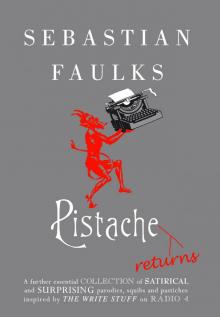 Pistache Returns
Pistache Returns The Girl at the Lion D'Or
The Girl at the Lion D'Or Pistache
Pistache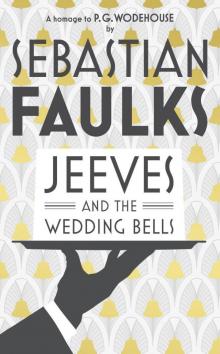 Jeeves and the Wedding Bells
Jeeves and the Wedding Bells A Week in December
A Week in December The Vintage Book of War Stories
The Vintage Book of War Stories Engleby
Engleby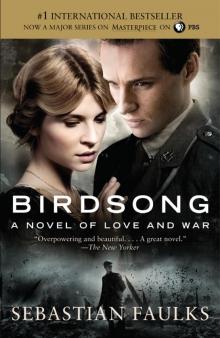 Birdsong
Birdsong Jack Firebrace's War
Jack Firebrace's War Where My Heart Used to Beat
Where My Heart Used to Beat A Possible Life
A Possible Life The Fatal Englishman: Three Short Lives
The Fatal Englishman: Three Short Lives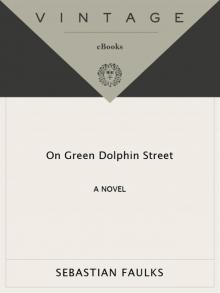 On Green Dolphin Street
On Green Dolphin Street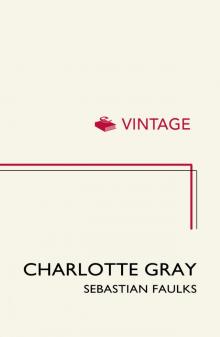 Charlotte Gray
Charlotte Gray A Broken World: Letters, Diaries and Memories of the Great War
A Broken World: Letters, Diaries and Memories of the Great War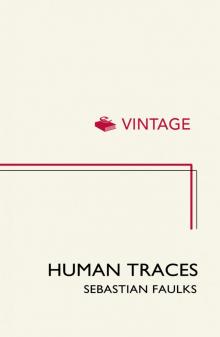 Human Traces
Human Traces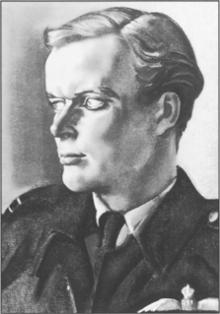 The Fatal Englishman
The Fatal Englishman A Broken World
A Broken World Paris Echo
Paris Echo War Stories
War Stories Girl At the Lion d'Or
Girl At the Lion d'Or